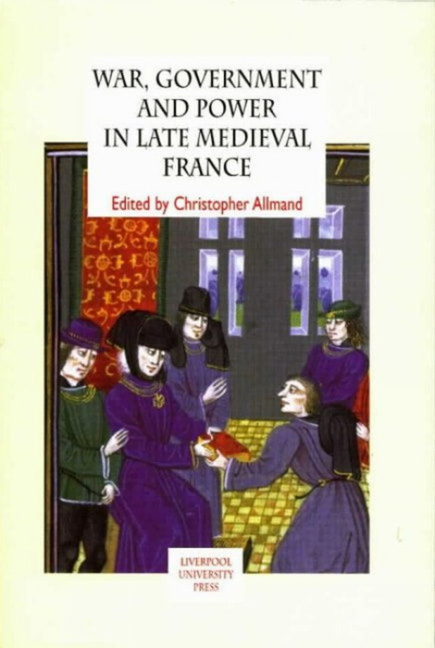Book contents
- Frontmatter
- Contents
- Dedication
- Acknowledgements
- Abbreviations
- Introduction
- 1 From the Court of Hainault to the Court of England: The Example of Jean Froissart
- 2 Froissart and his Second Book
- 3 Alain Chartier and the Arts of Crisis Management, 1417–1429
- 4 Intellectual Patterns and Affective Reactions in Defence of the Dauphin Charles, 1419–1422
- 5 War, Propaganda and Diplomacy in Fifteenth-Century France and England
- 6 History and the Literature of War: The Boke of Noblesse of William Worcester
- 7 Commynes on Kingship
- 8 ‘Centre’, ‘Power’ and ‘Periphery’ in Late Medieval French Historiography: Some Reflections
- 9 Centre and Periphery in Late Medieval France: Tournai, 1384–1477
- 10 ‘Decayed Feudalism’ and ‘Royal Clienteles’: Royal Office and Magnate Service in the Fifteenth Century
- 11 Justification and Theory of the Death Penalty at the Parlement of Paris in the Late Middle Ages
- 12 Membra disjecta of the Breton Chambre des Comptes in the Late Middle Ages: Treasures Revisited and Rediscovered
- Glossary
- Index
1 - From the Court of Hainault to the Court of England: The Example of Jean Froissart
- Frontmatter
- Contents
- Dedication
- Acknowledgements
- Abbreviations
- Introduction
- 1 From the Court of Hainault to the Court of England: The Example of Jean Froissart
- 2 Froissart and his Second Book
- 3 Alain Chartier and the Arts of Crisis Management, 1417–1429
- 4 Intellectual Patterns and Affective Reactions in Defence of the Dauphin Charles, 1419–1422
- 5 War, Propaganda and Diplomacy in Fifteenth-Century France and England
- 6 History and the Literature of War: The Boke of Noblesse of William Worcester
- 7 Commynes on Kingship
- 8 ‘Centre’, ‘Power’ and ‘Periphery’ in Late Medieval French Historiography: Some Reflections
- 9 Centre and Periphery in Late Medieval France: Tournai, 1384–1477
- 10 ‘Decayed Feudalism’ and ‘Royal Clienteles’: Royal Office and Magnate Service in the Fifteenth Century
- 11 Justification and Theory of the Death Penalty at the Parlement of Paris in the Late Middle Ages
- 12 Membra disjecta of the Breton Chambre des Comptes in the Late Middle Ages: Treasures Revisited and Rediscovered
- Glossary
- Index
Summary
From the court of Hainault to that of England. Such was the path followed by the young Jean Froissart when, a mere novice, he left his native land in search of patronage to enable him to pursue a career as a writer. One of the characteristics of the poet-chronicler lay in his inclination to describe himself in a manner which, from time to time, would allow the reader to join him, albeit furtively, in some of the major moments of his life. Among the many memories recorded in his work, the one which clearly touched him most was his long sojourn at the English court between 1362 and 1369. Fascinated from his earliest days by the world of chivalry, Froissart calls to mind the ostentatious living of that glittering society. Here, he moved among the followers of the highest in the land, glorying with them in the prestige of their recent victories. Constituting, as they did, the determining period of his career, these seven years allowed Froissart to establish his reputation. His first successes, so he felt, were made possible by the sovereign lady who, generously, accorded him her protection:
Phelippe eut nom la noble dame;
Propisces li soit Diex a l'ame!
J'en sui bien tenus de priier
Et ses largeces escriier,
Car elle me fist et crea …
Philippa was the noble lady's name,
May God take her into His care
I am bound to pray for her
And all her kind acts to describe,
For it was she who created me …
Nothing could be clearer: ‘it was she who created me’. It was Queen Philippa of England who, alone, through her largeces gave him the chance to assume his role as a writer. Notwithstanding Philippa's contribution, we should not fail to recognise the profound influence of the courtly circle which oversaw Froissart's origins. In addition to the young poet's personal experience, it is above all to the components of that literary circle that attention should be drawn here. This cultural environment drew its strength and influence from contacts established, over a period of some forty years, between two centres of French culture, the royal court of England and the comital court of Hainault, a milieu all the more remarkable for having encouraged the talent, in the 1360s, of another great figure of European literature, Geoffrey Chaucer.
French Literature at the Court of Hainault
- Type
- Chapter
- Information
- War, Government and Power in Late Medieval France , pp. 1 - 20Publisher: Liverpool University PressPrint publication year: 2000



